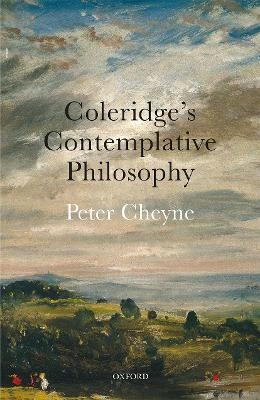
Coleridge's Contemplative Philosophy
Oxford University Press (Verlag)
978-0-19-885180-6 (ISBN)
'PHILOSOPHY, or the doctrine and discipline of ideas' as S. T. Coleridge understood it, is the theme of this book. It considers the most vital and mature vein of Coleridge's thought to be the contemplation of ideas objectively, as existing powers. A theory of ideas emerges in critical engagement with thinkers including Plato, Plotinus, Böhme, Kant, and Schelling. A commitment to the transcendence of reason, central to what he calls the spiritual platonic old England, distinguishes him from his German contemporaries. The book also engages with Coleridge's poetry, especially in a culminating chapter dedicated to the Limbo sequence.
This book pursues a theory of contemplation that draws from Coleridge's theories of imagination and the Ideas of Reason in his published texts and extensively from his thoughts as they developed throughout unpublished works, fragments, letters, and notebooks. He posited a hierarchy of cognition from basic sense intuition to the apprehension of scientific, ethical, and theological ideas. The structure of the book follows this thesis, beginning with sense data, moving upwards into aesthetic experience, imagination, and reason, with final chapters on formal logic and poetry that constellate the contemplation of ideas.
Coleridge's Contemplative Philosophy is not just a work of history of philosophy, it addresses a figure whose thinking is of continuing interest, arguing that contemplation of ideas and values has consequences for everyday morality and aesthetics, as well as metaphysics. The volume will be of interest to philosophers, intellectual historians, scholars of religion, and of literature.
Peter Cheyne is an Associate Professor at Shimane University and Visiting Fellow in Philosophy at Durham University. He is leading two international projects, one on Dynamic Philosophies of Life and Matter, 1650–1850, the other on Openness and Imperfection in Aesthetics and Ethics. He is editor of Coleridge and Contemplation (OUP, 2017) and co-editor (with Andy Hamilton and Max Paddison) of The Philosophy of Rhythm: Aesthetics, Music, Poetics (OUP, 2019).
Introduction
Part I: Imagination Launched into Reason
1: The 'Sense' of Knowledge
2: Contemplative Practice and the Ideas
3: Aesthetic Contemplation
Part II: Living Ideas
4: The Art of Poetic Life-Writing
5: Adapting Böhme's Bipolar Model
6: The Energic-Energetic Distinction and Coleridge's Two-Level Theory of Mind
Part III: Coleridge's Modified Platonism
7: The Divided Line: Lower and Higher
8: The Coleridgean Idea
Part IV: A Realizing Knowledge
9: Developing Polarity: Trichotomy, Tetractys, and Pentad
10: The Way Down and the Way Up
11: The Blind that Gaze, the Blind that Creep Back, Shades that Flit, and the Dragon
Conclusion
| Erscheinungsdatum | 20.03.2020 |
|---|---|
| Verlagsort | Oxford |
| Sprache | englisch |
| Maße | 160 x 230 mm |
| Gewicht | 718 g |
| Themenwelt | Geisteswissenschaften ► Philosophie |
| Geisteswissenschaften ► Sprach- / Literaturwissenschaft ► Anglistik / Amerikanistik | |
| Geisteswissenschaften ► Sprach- / Literaturwissenschaft ► Literaturgeschichte | |
| Geisteswissenschaften ► Sprach- / Literaturwissenschaft ► Literaturwissenschaft | |
| ISBN-10 | 0-19-885180-4 / 0198851804 |
| ISBN-13 | 978-0-19-885180-6 / 9780198851806 |
| Zustand | Neuware |
| Informationen gemäß Produktsicherheitsverordnung (GPSR) | |
| Haben Sie eine Frage zum Produkt? |
aus dem Bereich


